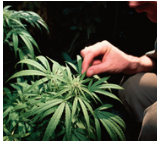DC DISPATCH--Perhaps lost in the recent news cycles, obstructed by the 24/7 Trump-Tweet buzz, was that the discredited cultural experiment of national alcohol prohibition reached the 85th anniversary of its dissolution.
It came the same week as a New York Times business section headline proclaimed: “This Is the Dawning of the Age of Pot Inc.”
Perhaps, then, it is time to consider that whole "regulate cannabis like alcohol" idea, given how much the legal-marijuana advocates compare the two. For example, Maine’s legal-pot effort was even called the “Campaign to Regulate Marijuana Like Alcohol”. It may be time to explore the limits of that analogy.
Every year, United States lawmakers “tweak” alcohol legalization, amending and repealing hundreds of rules in reaction to any number of pressures. This process is of course influenced by advocacy groups, with any number of funding avenues and interests.
 Anyone suggesting that the cannabis regulation is immune to those pressures is putting their head in the sand. Likewise, cannabis activists should realize that industry unity could fracture into fiefdoms. We have the alcohol industry, with veiled multiple tiers of interest. Beer, wine and spirits providers, as well as regulators, wholesalers and retailers have often feuding amongst themselves.
Anyone suggesting that the cannabis regulation is immune to those pressures is putting their head in the sand. Likewise, cannabis activists should realize that industry unity could fracture into fiefdoms. We have the alcohol industry, with veiled multiple tiers of interest. Beer, wine and spirits providers, as well as regulators, wholesalers and retailers have often feuding amongst themselves.
Similarly, conflicts are already present in pot communities: edibles, vaping and flower products. High profile companies pumping billions of dollars into the fray will only exacerbate intensify those conflicts.
A page from the history of boozey civil wars illustrates this point: A couple of weeks ago, amid the celebration of the repeal of prohibition, came this sobering (sorry, couldn’t resist) argument from Pamela Erickson’s website, the “Healthy AlcoholMarketplace”: “Historically, alcoholic beverages have been regulated and sold differently from other products. And spirits have been regulated differently than beer and wine—for good reason.”
Ms. Erickson is not exactly without experience, having been a former “expert witness” in court and having testified before the U.S. Congress. As a former director of the Oregon Liquor Control Commission, Ms. Erickson was actually in charge of a “control state.” A primer to those who would regulate cannabis like alcohol, “control states” own and operate the retail stores within their borders, and there are more than a dozen of them.
A recent missive from Ms. Erickson also warns that “... spirits are often the drink of choice for heavy drinkers. The heaviest 10% of drinkers, consume 63% of spirits produced. The price per drink of the cheapest brands of spirits can cost less than other forms of alcohol. The heaviest drinkers and youth tend to be price sensitive."
While we might embrace any warning of "the cheapest brands of spirits," you may not be shocked to find that information is not universally accepted.
Some quick research brought plenty of countering information, like:
- According to a CDC study, 74.4% of binge drinkers consume beer exclusively, or predominantly.
- Eight out of ten alcohol-related traffic deaths involve beer, according to MADD.
- According to data from the National Highway Traffic Safety Administration, 80% of drivers arrested for a DWI consumed beer.
- The 2018 National Academy of Sciences Report on Alcohol-Impaired Driving Fatalities states, “research suggests that drinking beer also has a greater correlation than drinking wine or distilled spirits to alcohol-impaired driving because drivers underestimate intoxication from beer and perceive less risk from beer consumption.
(For those who really care, you can find third-party info from the National Institutes of Health here, but beer fans beware because it takes a hard line on suds calories.)
The point here is not that a website creator, who may or may not offer sometimes-paid testimony for the “beer side” of a debate, has a lot to say about beer-v.-whiskey. Nor is it that ending alcohol prohibition is an ongoing process after 85 years. Rather, the point here is that some states ended prohibition by taking over the industry, and that once regulations begin, the road to unintended consequences can EVOLE INTO a super highway. It would be difficult to find a legal scholar or even a “talking head” suggesting we revert to the failed experiment of alcohol prohibition. Yet, the heroes of the cannabis revolution would do well to study the impacts regulation will have on what has thus far been a very grassroots process.
As a supporter of legal cannabis and grassroots movements in general, let me urge the revolutionaries help to develop a blueprint for moving forward. A cantankerous road to perdition awaits those who fail to heed history’s lessons.
(Sara Corcoran is publisher of the National Courts Monitor and writes for CityWatch, Daily Kos, and other news outlets.)
-cw
